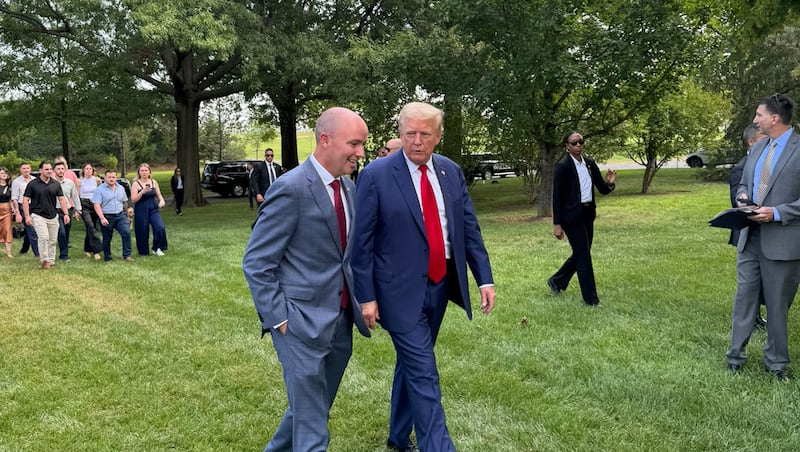Since Day One, President Donald Trump has unleashed an unprecedented volume of executive actions.
The policy tsunami has reshaped parts of the federal government. Much of it has also run into roadblocks from the courts and Congress.
But there is one lesson from the Beehive State that could help the president accomplish more of what he wants to get done, according to Utah Gov. Spencer Cox.
“I obviously would love him to adopt the ‘Disagree Better’ mantra,” Cox said Monday night. “I think he would be more successful if he did.”
Sitting at the Ronald Reagan Presidential Library in Simi Valley, California, Cox, a Republican, and New Mexico Gov. Michelle Lujan Grisham, a Democrat, explained how social polarization, performative politics and a loneliness epidemic created incentives ripe for dysfunction.
Much of the gridlock in Washington is caused by the federal government doing the job of states and Congress giving away its responsibilities to the other branches of government, Cox said.
This has resulted in an executive branch trying to do too much, according to Cox, and lawmakers being left with little to do except vie for attention on increasingly contentious online platforms.
“The federal government has gotten so much more powerful, which I think is a mistake, because what it does is it … makes us more polarized when we think that one size fits all,” Cox said. “Whoever’s the president gets to make all of these decisions that impact all of us, and so there’s a lot of unrest.”
Should Trump “Disagree Better”?
Before becoming Lujan Grisham’s vice chair in the Western Governors Association, Cox led a nationwide initiative to model healthy bipartisan dialogue as chair of the National Governors Association.
Toward the end of his term as chair, Cox surprised many of his supporters, and detractors, by endorsing Trump shortly after the Butler assassination attempt. He wrote Trump a personal letter where he encouraged the then-candidate “to turn down the temperature” in order to “unify and save our country.”
New Mexico Governor Michelle Lujan Grisham enters the House Chambers to deliver her State of the State speech at the Capitol, in Santa Fe, N.M., Jan. 16, 2024. | Roberto E. Rosales
On Monday, Cox joked that Trump would probably say that civility is “not his top priority.” But some of Cox’s fellow Utah conservatives are adamant that that is a good thing.
Brad Bonham, the state GOP’s national committeeman, and Cox’s former entrepreneur-in-residence, said that “Disagree Better” can get in the way of beneficial political victories if it is taken too far.
“While I agree we should try our best to be kind to one another, I strongly believe that being ‘nice’ has become the enemy of what’s right,” Bonham said. “Sometimes you need to cast out the money changers or hang a millstone around a child abuser.”
Speaking to the crowd gathered at the Reagan Foundation and Institute’s Center on Civility and Democracy, Cox said “Disagree Better” is often misunderstood as compromising core beliefs but it really means listening with respect to encourage constructive conflict.
However, Cox’s former gubernatorial opponent, and the likely next chair of the Utah Democratic Party, Brian King, said Cox’s message and his president — with whom Cox said he has “a great relationship” — are incompatible.
“When (Trump) ignores the rule of law and the Constitution, what we get from Governor Cox is either support or silence,” King said. “We need elected officials who will stand up for regular working Utahns.”
How can America be less divided?
While Cox and Lujan Grisham find themselves on opposite sides of most political debates — including their views on Trump — they agreed on Monday about the sources of America’s division and its solutions.
At the heart of the country’s toxic politics is loneliness, Cox said.
A series of studies recently showed that one-in-five Americans report feeling lonely most of the day and that the same percentage report having no close friends.
This has led to an increase in political tribalism, Cox said, as people replace “good tribes,” like local sports clubs, with “not-so-healthy tribes.”
“I do believe that we are lonelier than ever before, and I believe that that loneliness has left us with a hole inside,” Cox said. “If we don’t have any real friends, at least we can hate the same people together on Facebook, right?”
A survey conducted in January by the Reagan Institute’s Center on Civility and Democracy found that 52% of Americans, including 72% of seniors, believe that democracy is weaker now than in the past.
However, the same survey found that 83% of Americans want elected officials to find common ground with officials of different parties.
The solution to America’s political division and the dysfunction it fuels is the same thing Lujan Grisham said she discovered working with Native American tribes in New Mexico and what Cox said he discovered helping to broker Utah’s “Grand Compromise” on religious rights and LGBTQ discrimination in 2015.
Forming relationships with people who think differently from you is the only way to overcome an “addiction to outrage,” Cox said. But for this approach to catch on in Washington, D.C., it first needs to be valued and practiced by voters across the country.
“We can choose again, to have friends who are different than us, to learn from each other, to push back when we disagree, and do so in a way that respects each other,” Cox said. “Because at the end of the day, there’s nothing more un-American than hating our fellow Americans.”
Read the full article here


